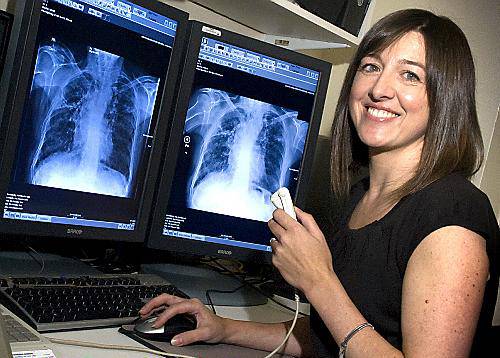Royal Oldham’s high-tech tonic
Date published: 03 November 2010

Dr Carolyn Allen, clinical director of radiology at The Pennine Acute Trust
ROYAL Oldham Hospital patients are to benefit from new CT scanners costing £2.2 million.
The Pennine Acute Hospitals NHS Trust is investing in the high-tech equipment, which it will use in Oldham, North Manchester General Hospital and Bury’s Fairfield General Hospital.
The trust’s board agreed to purchase three scanners over the next two years, saying they will bring wide ranging benefits to clinicians and patients. A new CT scanner was replaced at Rochdale Infirmary in April, 2008.
The scanners will replace machines already in operation at the trust’s hospitals, which are around nine-years-old.
Dr Carolyn Allen, clinical director of radiology, said: “This is fantastic news for the Trust and, most importantly, for our patients. As clinicians, we want the most up-to-date equipment to give patients the best service possible and these new scanners will represent this.
“Demand for CT scans within hospitals has risen steadily over the last few years and with the Healthy Futures plans for North Manchester General Hospital and The Royal Oldham Hospital to become planned trauma specialist centres, it is more important than ever that we invest in higher tech equipment.
“Our old scanners are so-called ‘four-slice’ but the new ones are 128 slices, which produce very detailed pictures of organs or the inside of the body, which help us reach a diagnosis about a wide variety of conditions.
“They can also scan a much larger area of the body in a very short time.
“The images are computer generated and the speed of processing will mean that clinicians will be able to get almost real-time 3D reconstructions at the click of a button.
“While faster scan times do not necessarily mean that we can scan significantly more patients, it does mean that we can perform far better quality diagnostic examinations, especially in those patients who are sickest.”
Patients had to hold their breath during scans with the old machines, which could be a struggle for the seriously ill, but the new machines will be quicker and more comfortable.
They will also allow virtual colonoscopy to be done at all the hospitals for the early detection of colon cancers.
Most Viewed News Stories
- 1You can score free tickets to a Latics game while supporting Dr Kershaw’s Hospice
- 2Primary school in Uppermill considers introducing new ‘faith-based’ entry criteria to tackle...
- 3Public inquiry announced into rail upgrade that could leave villages ‘cut off’ for months
- 4Tributes paid following death of hugely respected Oldham community figure Dale Harris
- 5Trio arrested, drugs and weapons seized following Chadderton raid




